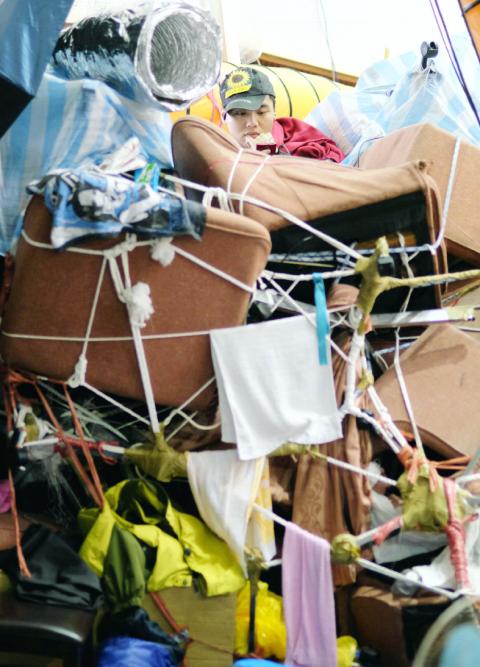The Ministry of the Interior said yesterday that any attempt to ask for donations for the Sunflower movement against the cross-strait service trade agreement would constitute a violation of the Political Donation Act (政治獻金法), which is punishable by a fine of twice the amount of money raised and the confiscation of all donations.
The ministry made the remarks one day after a Facebook page, titled “Repairing 318 Legislative Yuan,” was set up by netizens supportive of the Sunflower movement to solicit money for repairs to the damage inflicted to the legislative chamber during the protesters’ 24-day occupation.
The netizens planned to use the money to cover the rental fees for audio equipment installed inside and outside the legislature during the protest, which is scheduled to come to an end today.

Photo: Sam Yeh, AFP
Legislative Yuan staffers say the occupation has caused damage to chairs, doors, carpets, microphones, the broadcasting system and some valuable paintings.
“As the student movement is categorized as a political activity, any money donated to or raised for it will be deemed a political donation,” the ministry said, adding that only political parties, political associations and election candidates are allowed to accept political donations.
The ministry said student organizations that have claimed that their fund-raising attempts are for charitable purposes would have the legitimacy of their actions determined by the Control Yuan or the Ministry of Health and Welfare.
The ministry’s statement drew immediate criticism from netizens, some citing the more than NT$100 million (US$3.3 million) raised in 2006 by civic groups supporting a movement against then-president Chen Shui-bian (陳水扁) and accused the ministry of double standards.
“I wonder if anyone who solicited money for the movement at that time was ever fined,” a netizen wrote.
Separately yesterday, Legislative Yuan Speaker Wang Jin-pyng (王金平) said that as many “kind-hearted people” have expressed an intention to pay for the repairs, not a penny of taxpayers’ money would be used to cover the costs of the restoration work on the legislature.
Tsai Wei-min (蔡衛民) of the Legislative Yuan’s General Affairs Department on Tuesday turned down the offer by netizens to help to pay for the repairs.
Meanwhile, Executive Yuan spokesperson Sun Lih-chyun (孫立群) said yesterday that the Cabinet plans to seek NT$3 million compensation from the protesters who broke into and briefly took over the Executive Yuan compound on March 23.
Sun said the protesters destroyed four timber doors, 13 windows, a refrigerator, a photocopy machine, a fax machine, a cabinet, and several tables and chairs, which combined were worth NT$3 million.
“All the parties involved in the brief occupation have given their statements to police and have been summoned by prosecutors for questioning. We will file a civil lawsuit against them once prosecutors conclude their investigation,” Sun said.
Sun said that the Executive Yuan “is not currently considering” dropping the case against the protesters and “has not thought about” the possibility of accepting donations from businesses rather than asking the protesters to pay for the damage.
Additional reporting by CNA

SECURITY: As China is ‘reshaping’ Hong Kong’s population, Taiwan must raise the eligibility threshold for applications from Hong Kongers, Chiu Chui-cheng said When Hong Kong and Macau citizens apply for residency in Taiwan, it would be under a new category that includes a “national security observation period,” Mainland Affairs Council (MAC) Minister Chiu Chui-cheng (邱垂正) said yesterday. President William Lai (賴清德) on March 13 announced 17 strategies to counter China’s aggression toward Taiwan, including incorporating national security considerations into the review process for residency applications from Hong Kong and Macau citizens. The situation in Hong Kong is constantly changing, Chiu said to media yesterday on the sidelines of the Taipei Technology Run hosted by the Taipei Neihu Technology Park Development Association. With

CARROT AND STICK: While unrelenting in its military threats, China attracted nearly 40,000 Taiwanese to over 400 business events last year Nearly 40,000 Taiwanese last year joined industry events in China, such as conferences and trade fairs, supported by the Chinese government, a study showed yesterday, as Beijing ramps up a charm offensive toward Taipei alongside military pressure. China has long taken a carrot-and-stick approach to Taiwan, threatening it with the prospect of military action while reaching out to those it believes are amenable to Beijing’s point of view. Taiwanese security officials are wary of what they see as Beijing’s influence campaigns to sway public opinion after Taipei and Beijing gradually resumed travel links halted by the COVID-19 pandemic, but the scale of

A US Marine Corps regiment equipped with Naval Strike Missiles (NSM) is set to participate in the upcoming Balikatan 25 exercise in the Luzon Strait, marking the system’s first-ever deployment in the Philippines. US and Philippine officials have separately confirmed that the Navy Marine Expeditionary Ship Interdiction System (NMESIS) — the mobile launch platform for the Naval Strike Missile — would take part in the joint exercise. The missiles are being deployed to “a strategic first island chain chokepoint” in the waters between Taiwan proper and the Philippines, US-based Naval News reported. “The Luzon Strait and Bashi Channel represent a critical access

Pope Francis is be laid to rest on Saturday after lying in state for three days in St Peter’s Basilica, where the faithful are expected to flock to pay their respects to history’s first Latin American pontiff. The cardinals met yesterday in the Vatican’s synod hall to chart the next steps before a conclave begins to choose Francis’ successor, as condolences poured in from around the world. According to current norms, the conclave must begin between May 5 and 10. The cardinals set the funeral for Saturday at 10am in St Peter’s Square, to be celebrated by the dean of the College